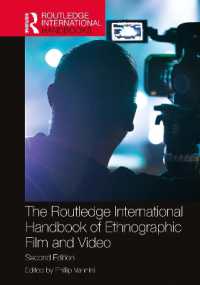Full Description
As a meaningful manifestation of how institutionalized the discipline has become, the new Handbook of Translation Studies is most welcome. It joins the other signs of maturation such as Summer Schools, the development of academic curricula, historical surveys, journals, book series, textbooks, terminologies, bibliographies and encyclopedias.
The HTS aims at disseminating knowledge about translation and interpreting and providing easy access to a large range of topics, traditions, and methods to a relatively broad audience: not only students who often adamantly prefer such user-friendliness, researchers and lecturers in Translation Studies, Translation & Interpreting professionals; but also scholars and experts from other disciplines (among which linguistics, sociology, history, psychology). In addition the HTS addresses any of those with a professional or personal interest in the problems of translation, interpreting, localization, editing, etc., such as communication specialists, journalists, literary critics, editors, public servants, business managers, (intercultural) organization specialists, media specialists, marketing professionals.
The usability, accessibility and flexibility of the HTS depend on the commitment of people who agree that Translation Studies does matter. All users are therefore invited to share their feedback. Any questions, remarks and suggestions for improvement can be sent to the editorial team at hts@kuleuven.be.
Next to the book edition (in printed and electronic, PDF, format), HTS is also available as an online resource, connected with the Translation Studies Bibliography. For access to the Handbook of Translation Studies Online, please visit http://www.benjamins.com/online/hts/
Contents
1. Bilingualism and translation (by Shreve, Gregory M.); 2. Common grounds in Translation and Interpreting (Studies) (by Grbic, Nadja); 3. Court/Legal interpreting (by Russell, Debra); 4. Cultural translation (by Conway, Kyle); 5. Development and translation (by Marais, Kobus); 6. Editorial policy and translation (by Sapiro, Gisele); 7. Equivalence (by Leal, Alice); 8. Eurocentrism (by van Doorslaer, Luc); 9. General translation theory (by Dizdar, Dilek); 10. Ideology and translation (by Baumgarten, Stefan); 11. Information, communication, translation (by Valdeon, Roberto A.); 12. Institutionalization of Translation Studies (by Gile, Daniel); 13. Interdisciplinarity in Translation Studies (by Lambert, Jose); 14. Language philosophy and translation (by Malmkjaer, Kirsten); 15. Media accessibility (by Remael, Aline); 16. Migration and translation (by Polezzi, Loredana); 17. Models in Translation Studies (by Chesterman, Andrew); 18. Music and translation (by Mateo, Marta); 19. National and cultural images (by van Doorslaer, Luc); 20. Postmodernism (by Wang, Ning); 21. Quality in interpreting (by Kalina, Sylvia); 22. Relay translation (by Ringmar, Martin); 23. Representation of translators and interpreters (by Kaindl, Klaus); 24. Rhetoric and translation (by Stecconi, Ubaldo); 25. Sociolinguistics and translation (by Pinto, Sara Ramos); 26. Teaching translation / Training translators (by Gambier, Yves); 27. Testing and assessment in Translation and Interpreting Studies (by Angelelli, Claudia V.); 28. Text linguistics and translation (by House, Juliane); 29. Translation criticism (by Paloposki, Outi); 30. Translation psychology (by Jaaskelainen, Riitta); 31. Translation rights (by Basalamah, Salah); 32. Subject index







